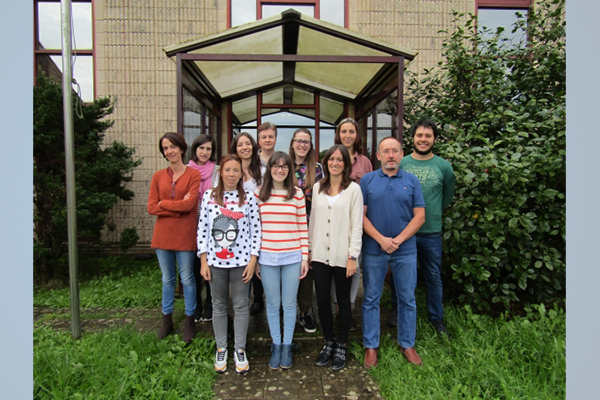Partners
Functionality and Ecology of Microorganism Benefits (MicroHealth)
Lead researcher: Abelardo Margolles Barros
Research Center: Instituto de Productos Lácteos de Asturias (IPLA-CSIC). Paseo Río Linares s/n. 33300 Villaviciosa. Asturias
Our group is focused on developing dietary and / or nutritional strategies that use bacteria, or compounds capable of modulating the microbiota profile and its activity, to maintain or restore the intestinal microbial balance and promote health. Our strengths are based on our extensive experience in microbial physiology, which allows us to characterize the functional and technological properties of a wide variety of microorganisms, and to address studies on probiotics, food microbiota and human microbiota. Our knowledge of functional genomics and bioinformatics allows us to carry out projects of bacterial genomics, proteomics and transcriptomics, as well as metagenomics of complex populations. On the other hand, to study the interactions between bacteria, the microbiota and the host, we have implemented several in vitro and in vivo models, including models with immortalized cell lines, immune cells and human tissues, as well as preclinical models in animals. We have also developed methods to study the bioavailability of nutrients and bioactives. The group develops its projects from a multidisciplinary perspective, counting on national and international collaborations including medical doctors, immunologists, nutritionists, chemists and bioinformatics, among others.
The main objective of our research group is to generate knowledge about the functions carried out by food and intestinal microorganisms in relation to human health. To achieve this general objective, we are developing different lines of research:
- Line 1. Functionality of microorganisms and probiotic foods
- Line 2. Interactions of intestinal microorganisms with the host and with technological challenges
- Line 3. Collection, preservation, and culture of faecal microbiota
- Line 4. Role of the microbiota in different physiological and pathological states: dysbiosis, microbial markers of disease and strategies to modulate the microbiota
- Line 5. Development of bioinformatic tools for the study of the functionality of microbiota and probiotics.
Gutierrez B, Gallardo I, Ruiz L, Alvarez Y, Cachofeiro V, Margolles A, Hernandez M, Nieto ML. Oleanolic acid ameliorates intestinal alterations associated with EAE. J Neuroinflammation. 2020 Nov 27;17(1):363. doi: 10.1186/s12974-020-02042-6.
Sabater C, Ruiz L, Delgado S, Ruas-Madiedo P, Margolles A. Valorization of Vegetable Food Waste and By-Products Through Fermentation Processes. Front Microbiol. 2020 Oct 20;11:581997. doi: 10.3389/fmicb.2020.581997. eCollection 2020.
Ruiz L, Flórez AB, Sánchez B, Moreno-Muñoz JA, Rodriguez-Palmero M, Jiménez J, Gavilán CGLR, Gueimonde M, Ruas-Madiedo P, Margolles A. Bifidobacteriumlongum subsp. infantis CECT7210 (B. infantis IM-1®) Displays In Vitro Activity against Some Intestinal Pathogens. Microorganisms. 2020 Nov 3;8(11):1720. doi: 10.3390/microorganisms8111720. Nutrients. 2020 Oct 24;12(11):3259. doi: 10.3390/nu12113259.
Marcos-Fernández R, Ruiz L, Blanco-Míguez A, Margolles A, Sánchez B. Precision modification of the human gut microbiota targeting surface-associated proteins. Sci Rep. 2021 Jan 14;11(1):1270. doi: 10.1038/s41598-020-80187-3.
Bajic SS, Cañas MA, Tolinacki M, Badia J, Sánchez B, Golic N, Margolles A, Baldomá L, Ruas-Madiedo P. Proteomic profile of extracellular vesicles released by Lactiplantibacillus plantarum BGAN8 and their internalization by non-polarized HT29 cell line. Sci Rep. 2020 Dec 11;10(1):21829. doi: 10.1038/s41598-020-78920-z.
Sabater C, Molinero-García N, Castro-Bravo N, Diez-Echave P, Hidalgo-García L, Delgado S, Sánchez B, Gálvez J, Margolles A, Ruas-Madiedo P. Exopolysaccharide Producing Bifidobacterium animalis subsp. lactis Strains Modify the Intestinal Microbiota and the Plasmatic Cytokine Levels of BALB/c Mice According to the Type of Polymer Synthesized. Front Microbiol. 2020 Nov 26;11:601233. doi: 10.3389/fmicb.2020.601233. eCollection 2020.
Margolles A, Ruiz L. Methods for Isolation and Recovery of Bifidobacteria. Methods Mol Biol. 2021;2278:1-12. doi: 10.1007/978-1-0716-1274-3_1.
Sabater C, Blanco-Doval A, Margolles A, Corzo N, Montilla A. Artichoke pectic oligosaccharide characterisation and virtual screening of prebiotic properties using in silico colonic fermentation. Carbohydr Polym. 2021 Mar 1;255:117367. doi: 10.1016/j.carbpol.2020.117367. Epub 2020 Nov 5.
Ruiz L, Sánchez B, Margolles A. Determination of Bile Salt Hydrolase Activity in Bifidobacteria. Methods Mol Biol. 2021;2278:149-155. doi: 10.1007/978-1-0716-1274-3_13.
Molinero N, Ruiz L, Milani C, GutiérrezDíaz I, Sánchez B, Mangifesta M, Segura J, Cambero I, Campelo AB, García-Bernardo CM, Cabrera A, Rodríguez JI, González S, Rodríguez JM, Ventura M, Delgado S, Margolles A. The human gallbladder microbiome is related to the physiological state and the biliary metabolic profile. Microbiome (in press).
Martínez N, HidalgoCantabrana C, Delgado S, Margolles A, Sánchez B. 2019. Filling the gap between collection, transport and storage of the human gut microbiota. Sci Rep 9:8327.
Ruiz L, Bacigalupe R, GarciaCarral C, Argüello H, Beatriz Silva C, Checa MA, Mira A, Rodriguez JM. 2019. Microbiota of human precolostrum and its potential role as a source of bacteria to the infant mouth. Sci Rep 9:8435.
Díaz M, Guadamuro L, EspinosaMartos I, Mancabelli L, Jiménez S, Molinos-Norniella C, Pérez-Solis D, Milani C, Rodríguez JM, Ventura M, Bousoño C, Gueimonde M, Margolles A, Díaz JJ, Delgado S. 2018. Microbiota and derived parameters in fecal samples of infants with nonIgE cow’s milk protein allergy under a restricted diet. Nutrients 10:1481.
BlancoMíguez A, Fdez-Riverola F, Lourenço A, Sánchez B. 2017. P4P: a peptidomebased strain-level genome comparison web tool. Nucleic Acids Res 45(W1):W265-W269
Motato KE, Milani C, Ventura M, Valencia FE, RuasMadiedo P, Delgad o S. 2017. Bacterial diversity of the Colombian fermented milk “Suero Costeño” assessed by culturing and highthroughput sequencing and DGGE analysis of 16S rRNA gene amplicons. Food Microbiol 68:129136.
Inturri R, Molinaro A, Di Lorenzo F, Blandino G, Tomasello B, HidalgoCantabrana C, De Castro C, Ruas-Madiedo P. 2017. Chemical and biological properties of the novel exopolysaccharide produced by a probiotic strain of Bifidobacterium longum. Carbohydr Polym 174:11721180.
Salazar N, Gueimonde M, de Los ReyesGavilán CG, Ruas-Madiedo P. 2016. Exopolysaccharides Produced by Lactic Acid Bacteria and Bifidobacteria as Fermentable Substrates by the Intestinal Microbiota. Crit Rev Food Sci Nutr 56:14401553.
HidalgoCantabrana C, Sánchez B, Milani C, Ventura M, Margolles A, Ruas-Madiedo P. 2014. Genomic overview and biological functions of exopolysaccharide biosynthesis in Bifidobacterium spp. Appl Environ Microbiol 80:918.

